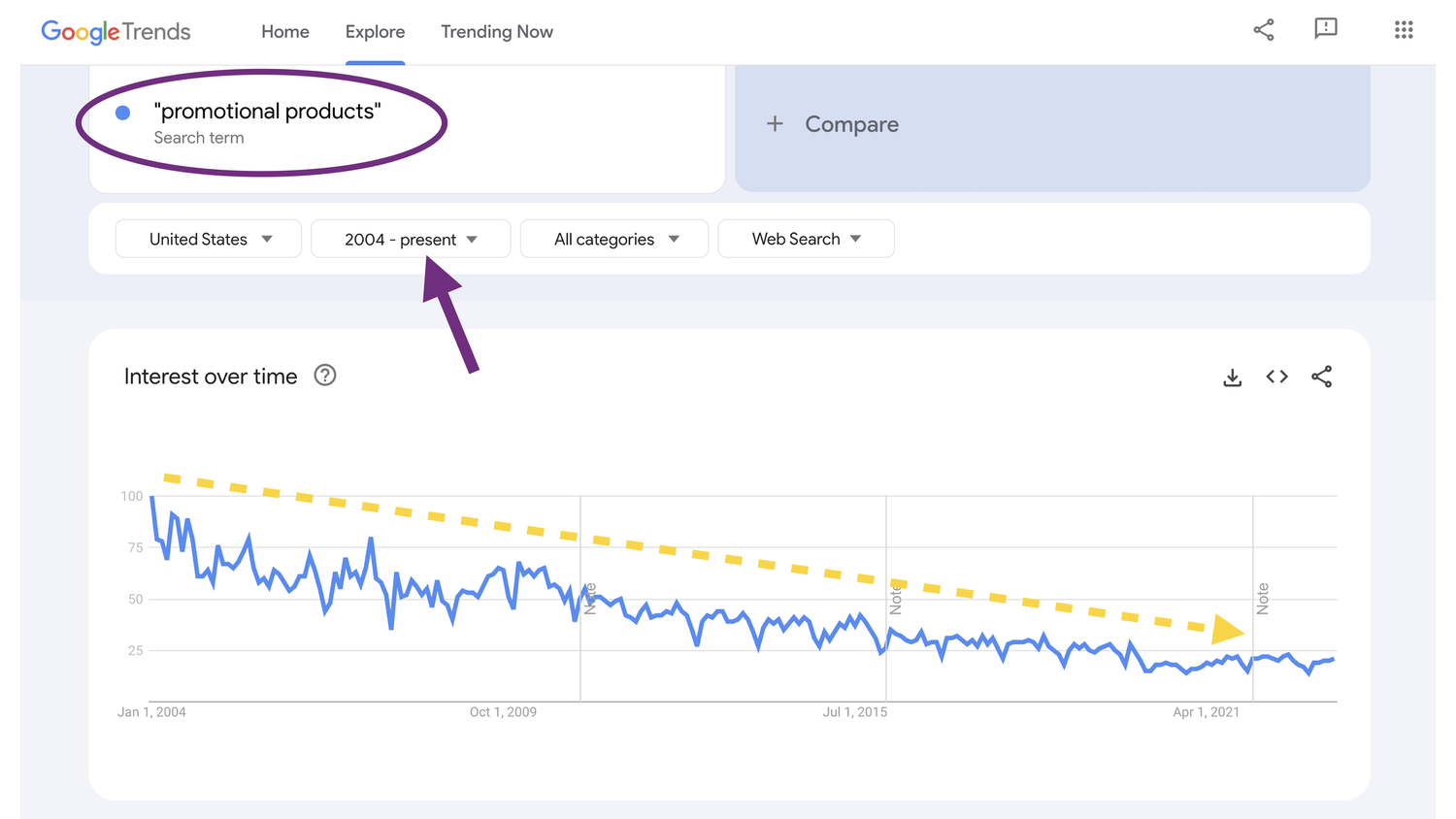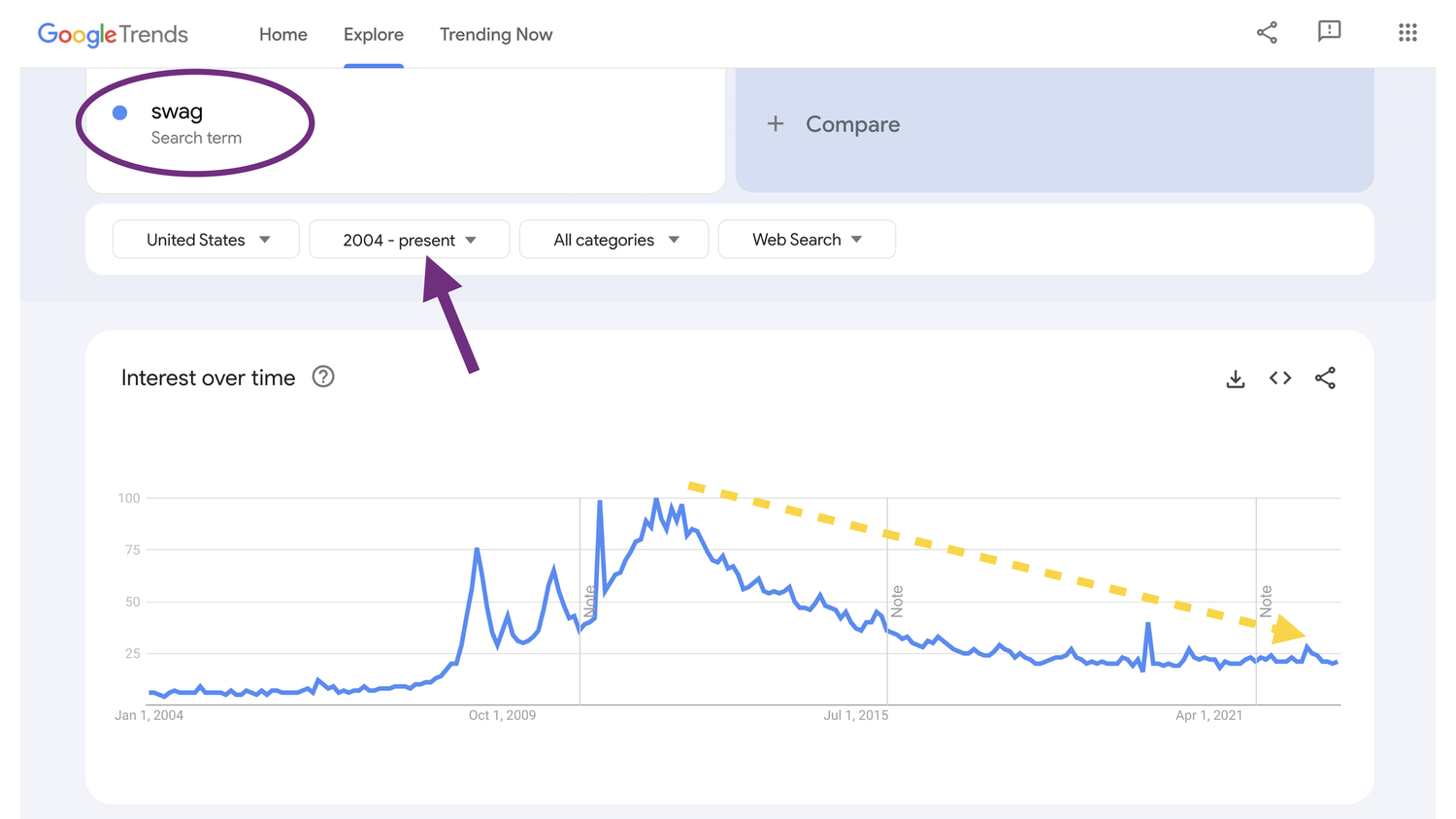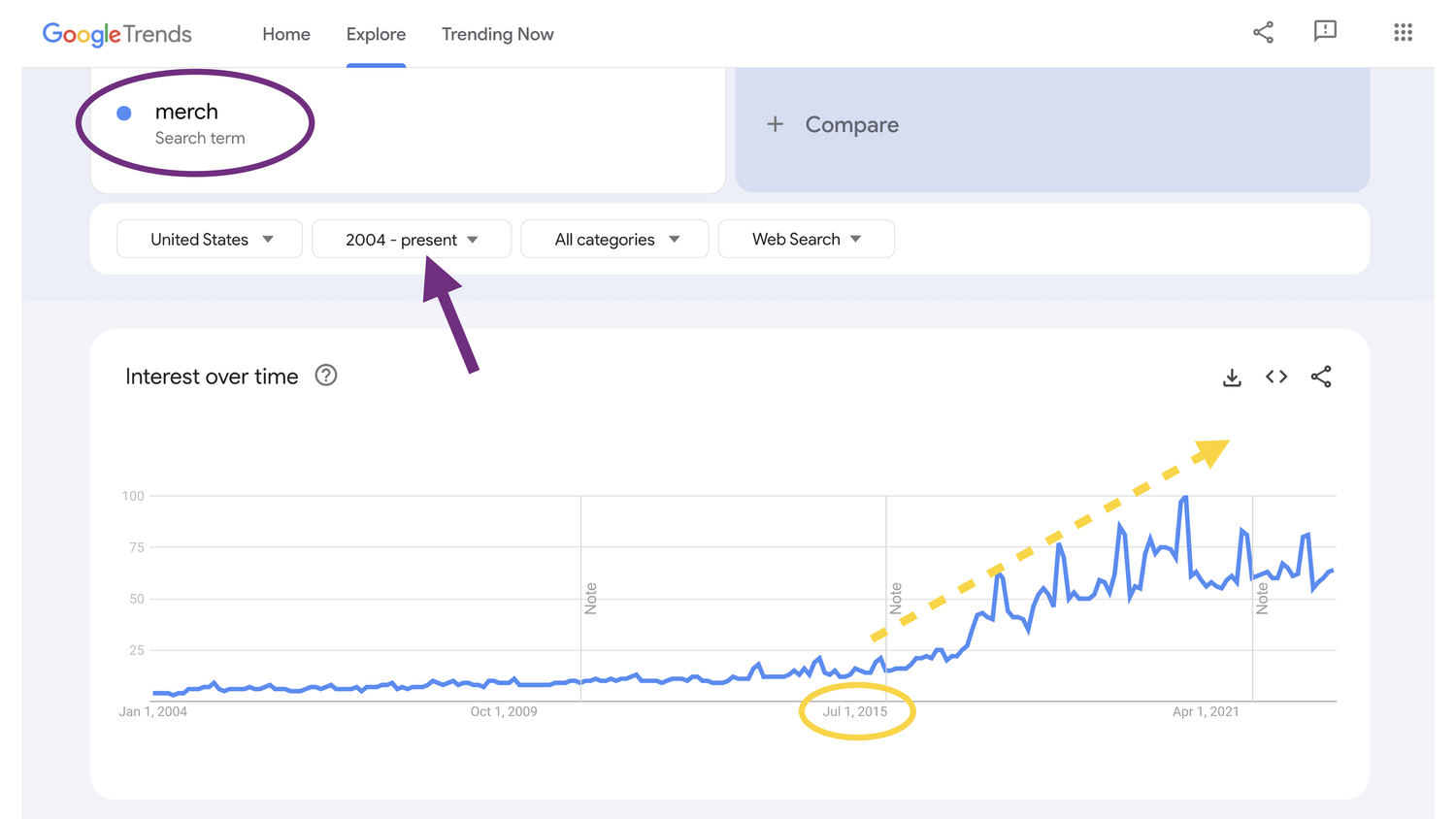SECTIONS
Swag vs. Merch: Why Nobody Calls it Swag Anymore (and That's A Good Thing)
.png)
(This article was original published in Dec, 2022 but was updated May 2023).
Nobody calls it “swag” anymore.
And that’s a good thing.
Even the word “promotional products” has fallen into disuse.
A recent headline in Adweek reads: “Why Every Brand Is Making Merchandise Right Now”
Other headlines:
-
“Justin Bieber and Tim Hortons Tap Into the Canadian Spirit To Unveil Collaborative Merch Collection” (Hypebeast)
-
“El Pollo Loco Amplifies Its Cultural Roots With Its First-Ever Online Merch Shop” (Adweek)
-
“If You Notice Branded Merch Everywhere, You Are Not Alone—Here Is Why” (Forbes)
It seems that while we were busy selling “swag” and “promotional products,” the market redefined what they buy with one simple word: merch.
Below are Google search trend results for each phrase (“swag,” “promotional products,” “branded merch”) reflecting almost twenty years of search history.
[Note: The number 100 at the top of the scale is not a numeric value but rather, 100 shows peak popularity for the term in searches].

750+ Distributors Trust commonsku to Grow Their Business
Seamlessly manage your team, collaborate with suppliers, and delight your clients with software for promotional products distributors.
“Promotional products” has slowly declined as a search term since 2004.

“Swag” reached the height of its popularity as a term about ten years ago.

But the word “merch” has swiftly taken over as the predominant phrase to describe logoed merchandise.

As the charts above show, “Promotional products” has slowly declined as a search term since 2004. “Swag” reached the height of its popularity as a term about ten years ago. But the word “merch” has swiftly taken over as the predominant phrase to describe logoed merchandise.
Why does this matter? Isn’t it just semantics?
There are three ways this shift impacts the future of your business (and with it, the future of our industry):
(I) “Branded Merch” Commands Higher Value
Say goodbye to CPS (cheap plastic stuff) and hello to HPV (higher perceived value).
When Covid brought a halt to trade shows and events, it also stemmed the flood of the mindless selling and buying of CPS (cheap plastic stuff). In the minds of some end-users, event swag became synonymous with landfill because recipients at trade shows tossed much of what they received. The unintended consequence of careless buying and conscienceless selling brought the opinion of swag (in the minds of some) to lower lows.
Contrast the public opinion about “swag” with the public opinion about “merch.”
Google the word merch and you’ll consistently find headlines citing a frenzied obsession over branded merch: “Timbiebs Merch Is Being Restocked At Tim Hortons Because So Many Locations Sold Out”; “Why Film Twitter Is Obsessed With Weird Movie Merch.”
“Merch” has become synonymous with products that people will pay a premium for and the implications this has for our industry can’t be overstated.
In today’s market, a brand is a band. Or, rather, a well-marketed brand is a band.
Band merch is highly coveted. Fans flock to support the brands they love and pay a premium for the opportunity to fly the colors. What a reversal: People are paying for an opportunity to advertise the b(r)and.
Several years ago, Cal McAllister, founder of the then iconic ad agency Wexley School for Girls, startled me with the simplicity of his definition of our industry, he turned to me and said, “Do you know what business you’re in? You’re a fan factory.”
When we think like a fan factory and less like a sourcing house for swag, we’ll command higher premiums, margins, respect, we’ll create better work and build a bigger (long-term) impact with our campaigns.
(II) “Branded Merch” is a World of Opportunity
Phrases like “promotional products” and “corporate merch” often relegate what we do to the B2B sector only. And it’s mostly those of us in the industry who make such distinctions, the customer (particularly Gen Z) rarely thinks within the confines of B2B vs. B2C.
In fact, younger buyers bring their B2C preferences (style, design, trends, etc) into their B2B purchasing decisions. For today’s buyer of merch, the B2B/B2C distinction is non-existent, which signals a great opportunity for us because the “the promotional products industry” is smaller than the world of branded merch.
There’s a big difference between the size of the market for branded merch and the size of the industry of promotional products.
Industry revenues are often cited as being between $20-$25 million and yet, these numbers don’t reflect the totality of branded merch being sold. Pan back with a wider lens and consider that the world of branded merchandise sold through agencies, screen printers, importers (and more) is a much wider market.
In the past week alone, I’ve heard two distributors cite how proud they were of their work with extremely high-profile B2C brands. This shift in who we sell to, and the experiences we create on their behalf, usher in a new opportunity. In our previous post, we talked about The Revolution Happening Right Under Your Nose, citing article after article of the revolution currently happening in branded merch.
For “the industry” the scope of opportunity has always existed within a specified framework, or perhaps a sampling of a broader framework, but the market potential today is vast.
(III) “Branded Merch” Meets the Pop-Up Shop and E-Com Obsession
When direct-to-business models like 4imprint arrived on the scene decades ago, most of us in the industry thought the business was over and that the e-commerce model would disrupt everything. We (erroneously) believed that, eventually, a majority of branded merchandise sales would transact through a website.
We were right and wrong.
We were wrong in that we thought every B2B buyer would purchase through a shopping cart experience like Amazon. Instead, the world shifted to boutique shopping experiences through e-commerce shops.
B2B buyers didn’t want to buy the same merch as everyone else, they wanted to create merchandise experiences that spoke to their unique brand identity and values and instead, wanted to express their distinction through their own shops. Examples abound today, but the vast majority of brands are creating their own shops to feature bespoke merch that caters to their audience.
And now, the new trend is even taking on micro merch experiences with pop-up shops or on-site activations, as evidenced by some of the biggest stars in music today. Check out what Ed Sheeran did to enhance his entire new album experience with merch, or if Styles is more your … um … style, check out Harry’s pop-up house-o-merch.
(Boutique and bespoke merch shops became so hot that we created an easy-to-build pop-up shop experience for merch distributors and agencies to meet that demand).
From artists to musicians to brands, if you spend any time on TikTok or Instagram or follow any leading influencers on YouTube or elsewhere, the phrase “check out our merch,” or “check out our latest drop” has become a distinct way to connect with an audience, build community, and distinguish a brand. “Merch” has become the defining term and it’s easy, fun, and now, ubiquitous.
Why Swag vs. Promotional Products vs. Branded Merch Even Matters
Industry die-hards (like me) will muster a call-to-arms over the etymology of what we do.
Some still love the word “swag.” Some hate it. Through the years, the name for our medium has changed, from “advertising specialties” to “promotional products” to “swag” to “branded merchandise, branded merch” to simply, “merch.”
And clients can’t be blamed for what they choose to call our medium. When clients use terms like “swag” or “merch”, they are simply reaching for an easy language handle to open a conversation, and often, whatever’s top-of-mind in popular culture is the term they’ll pick to describe it (which is why we’re seeing a trend toward “merch” over “swag”).
But the primary reason why it matters is that if the market is buying merch and we’re selling swag, we’ve got a serious disconnect.
Think of the implications on our SEO alone. As younger buyers continue to move into corporate purchasing roles, they bring with them their love of “merch.” If your SEO and your branding is centered around “promotional products” and “swag” and yet buyers are increasingly referring to it as “merch” then we’re (quite literally) selling the wrong product.
Revolutionize Your Promotional Products Business
Seamlessly manage your team, collaborate with suppliers, and delight your clients with software for promotional products distributors.
And for new recruits eyeing our industry or for younger recruits who are considering coming to work for your company, working in merch is honestly … pretty cool. They can see what’s happening around them with the b(r)ands they love and make a faster connection to what we do, in a way that’s inspiring and fun. Moreover, as cited in our previous article, the worlds of fashion, streetwear, and brands are coming together in a harmony never seen before, bringing with it an elevated opinion of the entire branded merch experience.
-
Branded merch commands higher premiums.
-
Branded merch has forward momentum.
-
Branded merch elevates your game.
-
Branded merch attracts A players.
-
Branded merch enlarges the playing field.
It might sound like semantics but the reality is, the world of branded merch has changed.
And that’s a good thing.
Editorial note: Since this article was published in 2022, we’ve documented the rise of branded merch and the trends driving this obsession in our newsletter called “The Backpack.” The Backpack features trends in merch, top articles and podcast episodes, and global news impacting merch life. It’s packed full of new content and delivered on the first and third Friday of each month by your friends at commonsku. Regardless of how you define what you sell, if you’re a promotional products, swag, or branded merch distributor or agency, subscribe to The Backpack for the latest in trends and insights from leaders in the field.
